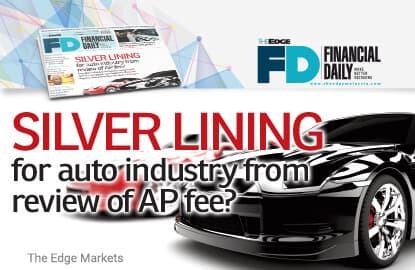
KUALA LUMPUR: Malaysia’s luxury automotive players may have a chance to increase their market share in the industry should the approved permit (AP) levy of RM10,000 per document be reduced or abolished.
An AP is an import and export licence issued based on the Customs Act 1967, while Open APs are usually used by parallel importers to import reconditioned luxury cars to sell them at slightly lower prices than the locally assembled ones.
To recap, Prime Minister Datuk Seri Najib Razak was quoted by Bernama on Saturday as saying that the government had agreed to review measures to ease the burden of companies regarding Open APs, especially on the RM10,000 levy.
At this juncture, the extent of the review is unclear but assuming a scenario in which the levy were to be scrapped, an automotive industry expert opined that this would not spell doom for the industry.
“Look at it this way ... a removal of the RM10,000 AP levy would mean that Open AP holders, who are mostly reconditioned luxury car traders, would have to pass on this benefit to the consumers in terms of a price reduction.
“Assuming that the Open AP holders don’t reduce car prices, this then opens a window of opportunity to luxury car players to reduce their car prices. Then the question arises whether they have the leverage to do so.
“Looking at the sales performance of BMW Group Malaysia and Mercedes-Benz Malaysia, which had both achieved record sales in 2016, I think you have your answer,” he said.
Another industry expert had a completely differing view on the impact to luxury carmakers should the levy be scrapped.
“Luxury carmakers would feel that it is unfair that these AP holders, who are already enjoying high profit margins, be presented with another incentive.
“Mechanisms such as the Open AP system does not present a level playing field for automotive players.
“Rather than removing the levy or reducing it for that matter, I would prefer if the government came up with a method that was more conducive to all players, such as removing the AP programme altogether in the spirit of true free trade,” he said.
Calls for the removal of the AP programme are not new. Former finance minister Tun Daim Zainuddin had said back in 2013 that the government should consider abolishing the Open AP policy for the import of vehicles to help reduce the cost of owning cars in Malaysia.
Open APs were introduced in the mid-1970s to encourage bumiputera businessmen to venture into car distribution. Under this system, all imported cars — meaning not assembled in Malaysia — must have Open APs, which the government issues to selected bumiputera-controlled licensees.
Bernama reported that since the introduction of the RM10,000 fee in 2012, the government has collected about RM2 billion. The total number of APs issued each year is capped at 10% of the preceding year’s total industry volume (TIV).
Under the National Automotive Policy, the Open AP Policy which was initially supposed to end on Dec 31, 2015, was continued with improvements under the new Open AP Policy.
BMW Malaysia head of corporate communications Sashi Ambi disagreed with the notion that the removal of the RM10,000 Open AP fee would not be welcomed by luxury carmakers.
“The Open AP programme was created to develop local entrepreneurs in the automotive industry here, while the National Automotive Policy was created for automotive manufacturers to increase their capabilities here for the region.
“Both the policy and the programme play an important role in the automotive industry here, and we at BMW believe that the Malaysian government is trying to find a synergy between the two for the benefit of the automotive industry here,” he said when contacted by The Edge Financial Daily.
Mercedes-Benz Malaysia vice-president of sales and marketing Mark Raine shared a similar sentiment.
“Mercedes is a committed investor in the local automotive market and like any investor hopes for a good return on investment. As a whole, since 2003 we have invested RM900 million in the Malaysian market.
“[We] hope that the Malaysian government will continue to put in place policies that promote a level playing field and transparency,” he told The Edge Financial Daily.
He also said any move that promotes a healthy automotive sector and a fair, level playing field is a positive one.
“We look forward to policies and incentives that will further spur growth of the local automotive industry,” added Raine.
BMW Malaysia sold a record 10,906 units of BMW, MINI and BMW Motorrad vehicles in the country last year, up 16% from 9,368 units in 2015.
This marks the sixth consecutive year the premium carmaker has set a new sales record.
Mercedes-Benz Malaysia’s sales volume rose 8.6% to an all-time high of 11,779 vehicles in 2016 from 10,845 units a year earlier, spearheaded by the C-Class sales
The Malaysian Automotive Association is expected to release the TIV numbers for 2016 later this week.
